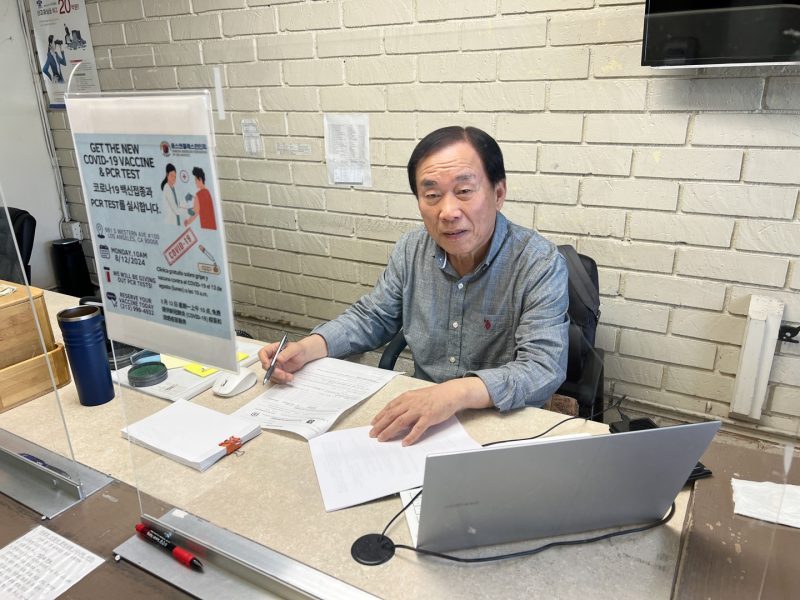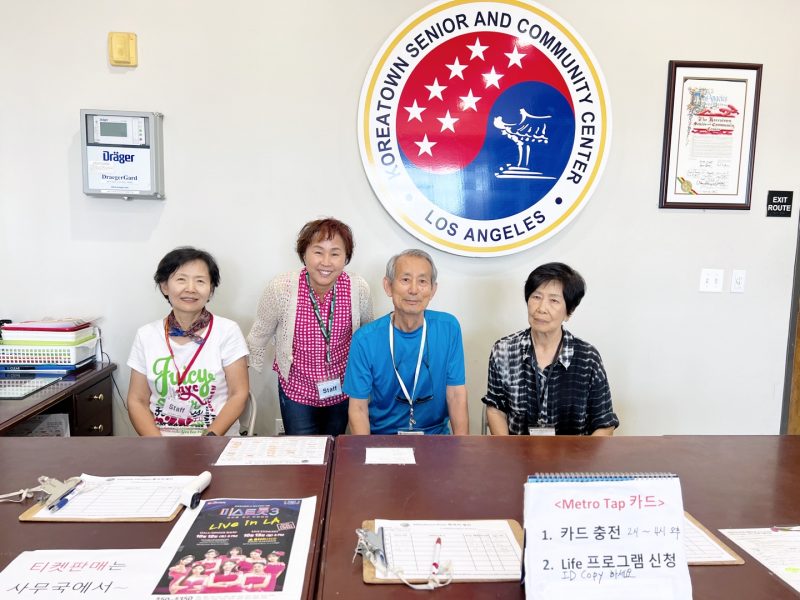[The Korea Daily-USC: Healing California Project]
The hallway entrance to the KAFLA (Korean American Federation of Los Angeles) office is where 74-year-old Seungpyo Cha clocks in for his unpaid work. At his desk in the corridor where the AC-cooled air is too far to reach, only an electric fan is cooling the hottest days of the summer. For five years, Cha has been coming to work every Monday through Friday as a volunteer.
Here, he helps Korean-American seniors with their paperwork even as little as utility bills to public service applications such as transportation cards and senior apartments. Unlike other people of his age, for him, being on his laptop in an office hallway and reviewing English-written documents does not embarrass him.
“I used to work for the government for a long time,” he said. “I’m very used to administrative work. What do I do after retiring and staying at home? I come out here and help people of Koreatown with English documents that they have trouble with. They seem to be happy to solve their problems, and that makes me feel good.”

Despite it being an unpaid volunteer job, Cha hates to take it lightly. He wakes up at 6 a.m. on weekdays to get ready for work. Having to walk a one-hour distance is a deliberate exercise for his health. At 9 a.m., Cha sits down at his desk in the hallway and begins to work on his laptop to help on average 20 people a day with their paperwork until 3 p.m.
Perhaps it’s the sense of responsibility for filling out other people’s documents that he hasn’t made a single mistake in the past five years, he laughed.
The source of his strength that he could manage to volunteer for five years almost as a full-time employee is the health and satisfaction from his job.
“It’s okay that Korean immigrants and seniors don’t speak English, but they often have no idea if the mail they receive is Medi-Cal, CalFresh, or just an advertisement. Some people came to me saying they couldn’t go to sleep because they were so worried and anxious about what was in the English mail. Hearing their stories, I feel frustrated and sorry for them. It’s rewarding to see those who have nowhere else to turn to come here and get their paperwork sorted out.”

Seniors help seniors
In many places in Koreatown, senior volunteers in their 60s and 80s can be found. The volunteers work for nonprofits, including the KAFLA, Korean Resource Center, and Koreatown Senior and Community Center.
More than a dozen senior volunteers that the Korea Daily met described the work as “healthy aging and being of service to others”, being their top motivations for volunteering work. Although the stress and pressure of interacting with people were sometimes overwhelming, they said they want to continue volunteering as long as they can. To them, volunteering brings them joy in their lives.
The volunteers are 77-year-old Kiyeol Choi, 78-year-old Insook Jung, 68-year-old Younghee Yoon, 69-year-old Victoria Lee, and 59-year-old Hyoki Lee, who work at the information desk on the first floor of the Koreatown senior center.
Their tasks range from cleaning and maintaining the center, applying for metro transit cards and applying for tickets to different events, to signing up for over 40 free classes at the senior center. In short, they get their hands dirty with everything that goes into running the facility. Counseling and guiding more than 200 seniors who come through the center every day is also one part of their job.
“At first, I started volunteering to come and go to take care of my health,” said Choi, who has been with the center for 13 years. “But when I come out here and meet and talk to people, it brightens my life. I want to be here for those who come here as long as I can, or until I leave,” he said.
Victoria Lee is in charge of handling the paperwork. “Thanks to my father, who taught me to read in English, I can help the elderly with their paperwork. I also have to do cleaning but I take it as an exercise,” she said.
Secrets to preventing depression and dementia
Jung was a businesswoman in her heyday. Having to stay at home instead of being active sapped her energy, making her demotivated and depressed.
“When you stay home alone… it’s really hard,” she said. ”The best thing about starting volunteer work eight years ago is actually just getting to meet a lot of people. I don’t have to worry about depression or dementia anymore, and I feel more energized in almost all aspects of my life.”
“The work helps me keep up with my lifelong habit of going to work,” said Jung. “I also feel proud of my job when I can assist the elderly at the senior center with programs and give my suggestions for customized courses.
Yoon has been volunteering to work at the center for seven years, noting that working is like “restoring self-esteem”.
“I’ve been a stay-at-home mother all my life. After raising my children and staying at home, I was depressed. All my chores were done in the morning. If I didn’t have anything to do in the afternoon, I would think, ‘Why am I doing this, why am I living like this?’ making me feel down again.”
It wasn’t too long after she decided to go outside when she was soon prized with a sense of fulfillment and rejuvenation by being “someone useful”, she said.
“I tried to go for a walk around the neighborhood and go shopping, but that kind of fun fades away quickly,” Yoon said, adding, “Above all, it’s very rewarding to know that I’m helping to improve the community and the senior center. To me, coming here for volunteer work is good for both my physical and mental health, even for learning social skills by meeting new people. This is how I found my happiness.”
The benefits of volunteering for seniors
Numerous studies have shown that volunteering has positive impacts on seniors’ lives.
A study by the Corporation for National and Community Service (CNCS), a federally funded volunteer program, “Volunteering can improve the health and well-being of people age 55 and older,” found that when seniors participate in volunteer activities, they become healthier including preventing dementia and feel less depressed.
The report also noted that volunteering allows seniors to “feel fulfilled, restore self-esteem, achieve personal growth, and form meaningful relationships”.
The report also found that 84% of seniors who participated in volunteering activities for two or more years reported improved or stable health. Among seniors who reported five or more symptoms of depression when they started volunteering, 78% reported feeling less depressed two years later. Eighty-eight percent of seniors who said they lacked friends at the beginning of volunteering also reported feeling less isolated two years later.
BY HYOUNGJAE KIM, HOONSIK WOO [kim.ian@koreadaily.com]




![Green card interviews used as decoy for ICE arrests U.S. Immigration and Customs Enforcement (ICE) agents arrest a man after a hearing at an immigration court in Manhattan, New York, on Oct. 27. [REUTERS]](https://www.koreadailyus.com/wp-content/uploads/2025/12/1226-ICE-100x70.jpg)
